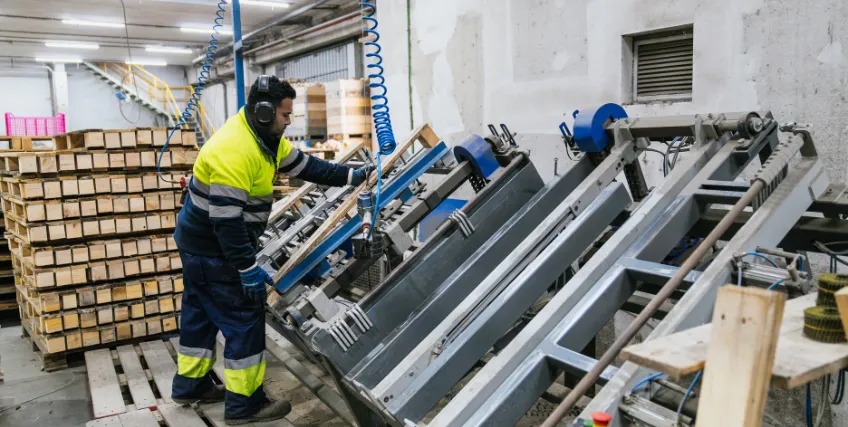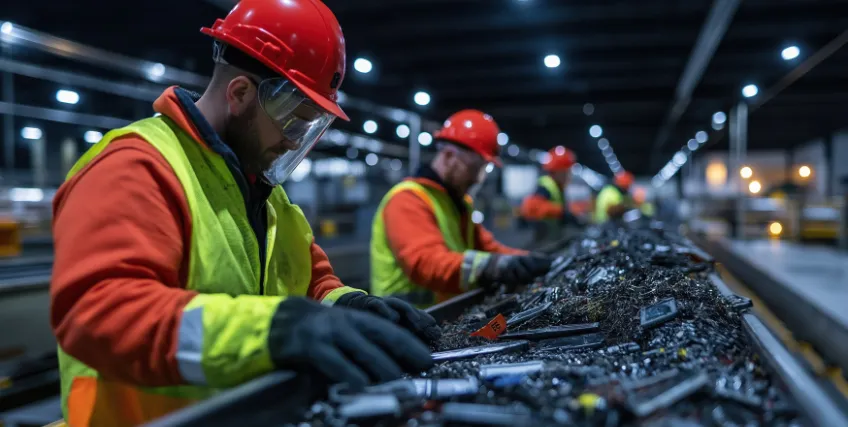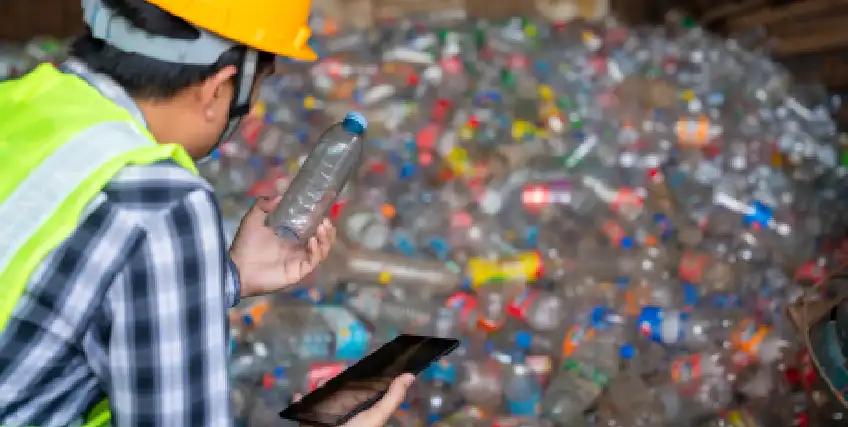Equipment Financing for Recycling Companies: How to Upgrade Your Operations
Sep 04, 2025 | Last Updated on: Sep 08, 2025

The recycling industry in the U.S. is evolving fast. These days companies are under pressure to process more waste, comply with regulations, and keep operations efficient. At the same time, recycling equipment like balers, conveyers, and shredders are costly to purchase and often require a large upfront investment. However, not every small business has that kind of cash flow on hand.
Recycling equipment financing offers a practical way to modernize without draining your working capital. In this guide, we’ll walk through the different recycling equipment financing solutions, benefits of equipment financing and how to qualify.
Why Upgrading Recycling Equipment Matters
The recycling industry has evolved significantly over the years. Stricter regulations, diverse waste streams, and technological advancements have made operations more complex than ever before. Therefore, to keep pace with these changes, recycling companies typically face pressure to innovate and optimize their processes.
When your equipment falls behind, your entire operation risks becoming inefficient and less competitive. Hence, prioritizing upgrades to your recycling equipment is important to maintain high productivity, meet regulatory standards, and position your business for sustainable growth.
Here’s why equipment financing for recycling companies matter:
- Boosts speed and productivity: Recycling equipment financing can help replace slow old machines with the new ones.
- Improves accuracy: Recycling companies can invest in waste management equipment financing to purchase advanced optical sorters and sensors to reduce contamination. That means higher material value.
- Increases safety: Funding recycling equipment helps purchase newer models that meet OSHA standards and protect your team better.
- Cuts energy costs: Purchasing energy-efficient balers and shredders consume less power.
- Handles more materials: Modern recycling operations now handle a wide variety of complex materials, including lithium batteries, food waste for composting, mixed plastics, and large roll-off containers.
What Is Recycling Equipment Financing?
Recycling equipment financing is a funding solution that helps businesses purchase waste management equipment without paying the full cost upfront. Instead of using large amounts of working capital, businesses can secure loans or leasing agreements that break the cost into manageable monthly payments. Hence, this structure helps preserve cash flow while allowing access to modern, efficient recycling machinery.
Recycling companies often rely on expensive equipment like balers, shredders, compactors, crushers, grinders, and garbage trucks. Recycling equipment financing allows them to upgrade or replace older machines with newer, more efficient models. Whether a company is just starting out or expanding operations, this financing approach helps meet business needs without draining resources.
Additionally, recycling equipment financing can be especially useful when handling large equipment purchases such as roll-off containers, conveyors, or specialty waste disposal systems.
Types of Equipment Financing for Recycling Companies
Here are different types of recycling equipment financing options that serve different business needs. Let’s break down what’s available.
Equipment Loans
Equipment loans provide businesses with a lump sum of money that is repaid over time with fixed monthly payments. This type of loan allows the borrower to own the equipment outright once the loan is paid off. It is an ideal recycling equipment financing solution for companies planning to keep and use equipment for the long term.
Recycling businesses often use equipment loans to purchase essential machinery such as industrial crushers, grinders, balers, or even used equipment that fits their budget. By taking out an equipment loan, these companies can invest in assets that improve their operational efficiency without tying up all their cash upfront.
Equipment Leasing
Equipment leasing offers a way to use recycling equipment without owning it outright. Instead, businesses pay monthly lease payments to rent the equipment for a specified period. Leasing generally requires lower upfront costs and monthly payments compared to loans, making it attractive for companies wanting to preserve working capital or upgrade technology frequently.
Recycling companies may lease equipment such as shredders, compactors, or conveyors, especially when they expect rapid changes in technology or need equipment only for short-term projects. At the end of the lease, some leasing agreements allow the option to purchase the equipment.
Sale-Leaseback
Sale-leaseback recycling equipment financing allows recycling companies to sell equipment they already own to a lender and then lease it back. This arrangement frees up capital that was previously tied up in assets, providing immediate cash flow without disrupting operations.
Here, businesses continue using the equipment but convert a fixed asset into working capital, which can be reinvested into other areas like expansion or maintenance. This recycling equipment financing option is particularly useful for companies that need cash quickly but want to keep relying on their existing waste management equipment.
Vendor Financing
Vendor financing is a type of equipment financing offered directly by the equipment manufacturer or seller. It often comes with additional benefits like bundled warranties or maintenance services, making it convenient for recycling companies. This financing option may have competitive terms but varies significantly depending on the vendor.
Recycling businesses should carefully compare these programs with other recycling equipment financing solutions to ensure they are getting the best deal. Moreover, vendor financing can be especially helpful for businesses purchasing specialized or customized equipment.
SBA Loans
Small Business Administration (SBA) loans are government-backed loans designed to help small businesses access financing with favorable terms. These loans typically offer longer repayment periods and lower interest rates compared to conventional loans.
For recycling companies, SBA loans can be an excellent option to fund expensive equipment purchases without the burden of high upfront costs or restrictive terms. However, SBA loans require more paperwork and stronger credit profiles. The SBA 7(a) and 504 loan programs are common choices for businesses aiming to finance recycling equipment or expand their operations sustainably.
Benefits of Equipment Financing for Recycling Companies
There’s more to recycling equipment financing than just convenience. It can actually improve your waste management operations.
Here’s how:
- Protects your cash flow: Keep money available for payroll, marketing, or maintenance.
- Speeds up growth: Fund recycling expansion quickly without delay.
- Improves tax efficiency: Section 179 offers tax-deductible benefits on many equipment purchases. (Always check with your CPA.)
- Predictable monthly payments: Budgeting becomes easier with consistent terms.
- Better access to modern equipment: Keep up with industry standards without large upfront costs.
How to Qualify for Recycling Equipment Financing
Getting approved for recycling equipment financing isn’t hard if you know what lenders look for. Here’s what most lenders will ask for:
- Been in business for some time, usually 12 months or more.
- Have a fair to good credit score.
- Earn steady revenue annually.
- Provide proof of income such as bank statements or tax returns.
- Hold all necessary business licenses and legal documents.
Also, some recycling equipment financing options exist for businesses that want to buy used equipment, too. Even if your company is new, there are financing solutions out there. Many lenders also offer waste management equipment financing with fewer requirements.
Pro Tip: A clear application process with defined equipment needs helps lenders make fast decisions.
Equipment Purchasing vs. Leasing: What’s Better for Your Business?
This is one of the biggest decisions for recycling companies. However, the answer depends on your business needs and equipment usage. Let’s simplify:
Consider purchasing if you:
- Want long-term ownership
- Plan to use the equipment for 5+ years
- Can manage a down payment
Consider equipment leasing if you:
- Want lower monthly payments
- Need flexibility to upgrade frequently
- Prefer preserving your working capital
Quick Comparison
|
Feature |
Equipment Purchasing |
Equipment Leasing |
|
Ownership |
You own the equipment |
Equipment remains with the lender or lessor |
|
Upfront Cost |
Higher upfront costs |
Lower upfront costs |
|
Monthly Payments |
Maybe higher |
Usually lower and spread out payments |
|
Flexibility |
Less flexible |
More flexible upgrade options |
|
Possible Tax Benefits |
Eligible for depreciation |
Lease payments may be tax-deductible |
Leasing may cost more over time, but it can be fully tax-deductible. If your business needs the newest tech every few years or wants to preserve capital, leasing could make more sense. On the other hand, if you plan to use your equipment for a decade and want to build asset value, financing might be better.
Hence, talk with your accountant and financing provider to weigh up all the options. The right decision will depend on your cash flow, growth plans, and how fast your tech needs change.
The Bottom Line
Growth in the recycling industry doesn’t have to come at a huge cost. Smart waste management begins with smarter investments. Recycling equipment financing offers a flexible, fast way to meet your equipment needs.
From garbage trucks to crushers and balers, there are financing options for every recycling business. You can even fund recycling expansion projects using tax benefits and lower-cost programs.
Hence, start comparing multiple financing programs, choose a lender who understands your business, and apply for a financial solution that fits your operations.
FAQs About Recycling Equipment Financing
What types of equipment financing are best suited for recycling companies?
There are several financing options available, including equipment loans, equipment leasing, sale-leasebacks, vendor financing, and SBA loans. However, the best choice often depends on factors like your company’s cash flow, equipment needs, and long-term goals.
How does equipment leasing differ from taking out a loan?
Equipment leasing typically involves lower monthly payments and less upfront cost, but you don’t own the equipment at the end of the lease. Whereas equipment loans usually require higher initial payments but result in ownership. Therefore, the right option can vary based on your business’s flexibility and equipment usage.
Can small or new recycling businesses qualify for equipment financing?
Qualification depends on many factors, such as credit history, revenue, and business duration. Some lenders may offer programs suited for newer businesses, but it often requires clear documentation and a strong business plan.
What kind of equipment can recycling companies finance?
Financing can cover a wide range of equipment, from balers and shredders to conveyors, crushers, and garbage trucks. However, specific eligibility might depend on the lender’s criteria and the equipment’s condition or purpose.
Are there possible tax benefits to financing recycling equipment?
Many businesses find that recycling equipment financing offers potential tax advantages, such as deductions on lease payments or depreciation. However, tax implications vary widely and consulting a tax professional is usually recommended.
Frequent searches leading to this page
Related Articles
Term Loans are made by Itria Ventures LLC or Cross River Bank, Member FDIC. This is not a deposit product. California residents: Itria Ventures LLC is licensed by the Department of Financial Protection and Innovation. Loans are made or arranged pursuant to California Financing Law License # 60DBO-35839




